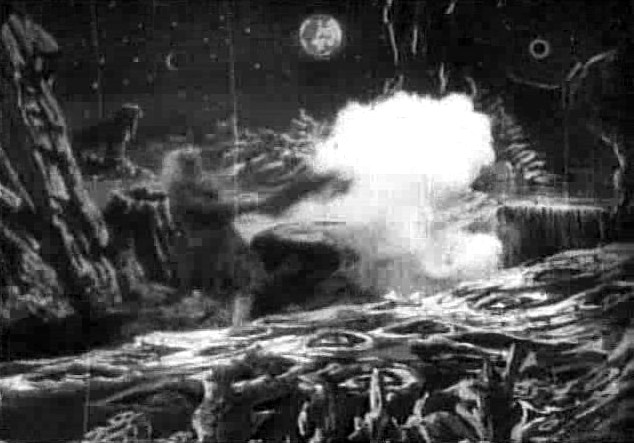The Moon, a Violent Frontier
Previously there occurred to me an idea for a post (since scrapped), called something like "H.G. Wells, Master of Humor and Pathos." The gist of it, which I saw again in The First Men in the Moon*, is his unique knack for combining both emotions to pull you into the scientific-adventure plots. Though having enjoyed his other best-known novels, I had middling hopes for this one (perhaps guided by the bias that it was not included in my hardback anthology, but never mind that). Turned out to be every bit as good.
If Cavor is the model mad scientist, then Bedford is the archetypical starving writer, whose moment of inspiration is abruptly disturbed by Cavor's customary stroll by his house. An unexpected collaboration on creating the scientist's Cavorite (a sort of anti-gravity substance) sends them literally to the moon. The moon, contrary to Cavor's expectations, is not uninhabited. This sets the two inventors at odds with each other, since Cavor is quite taken by the moon people, the tentacled Selenites, while Bedford's priority is to recover their own transportation contraption and get back to earth in one piece.
Now, the reason I'm giving this 5 out of 5 stars is not necessarily due to the plot. The plot is quite bland, especially by Trekkie standards. The two things which made this book were Cavor and the social commentary via Bedford and the Selenites.
What kind of social commentary? I was expecting something along the lines of anti-capitalism and pro-socialism, but Wells brings out both worldviews pretty effectively. Bedford represents the caricatured capitalist mindset, interested first and foremost in the gold and other resources that can be found on the moon (and yes, there is gold somehow). The Selenites, on the other hand, practice an extremely systematic and efficient type of socialism, where everyone is born, bred, and biologically altered into their life's designated purpose. Bedford's inherent violent nature is upfront and unabashed - the Selenites keep a subtle kind of violence, even sadism, behind their peaceful aspirations. Bedford is obnoxiously thoughtless of others, the Selenite world is insidiously so. Both sides build up to a critical point - human life - and then the comparison just clicks into place. In his sci-fi novels, Wells doesn't sacrifice realism for ideals.
There is humor in the gloom, though, for which we can thank Cavor. Cavor is a delightful character, like most people a guy with good ideas stuck in the role of wannabe. He could never reach the elevated status of Vernian or Federation scientists. This is partly due to his own bumbling, haphazard way of working and partly due to his general lack of glam. Poor Cavor! If you can relate to him on any level, you will certainly like this book.
Overall - The First Men in the Moon is not quite as gripping plot-wise as The Time Machine or The Island of Dr. Moreau, but if you stick with it, the book as a whole gives you a lot of food for thought. Recommended if you're looking for a new classic sci-fi read.
*For the purposes of multitasking I switched to Mark F. Smith's Librivox recording at around chapter ten, and happily I can highly recommend it for anyone interested in an audiobook. He does a great job of differentiating between the voices (Cavor's is a right on!), which is essential for this particular book.




Comments